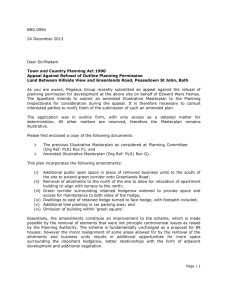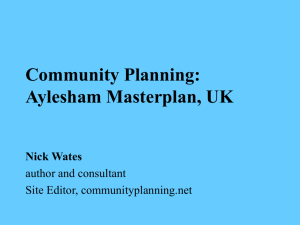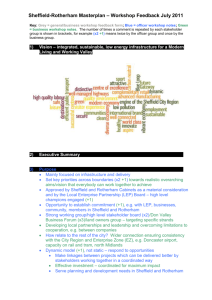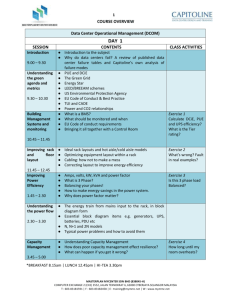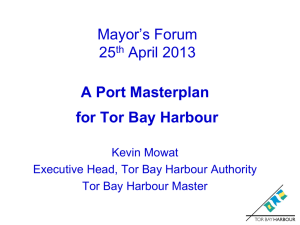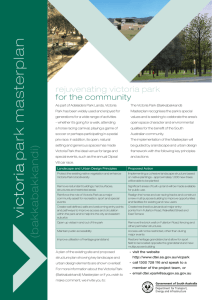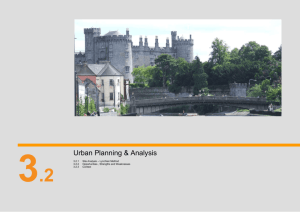Regenerating Middleport: using health impact assessment to
advertisement
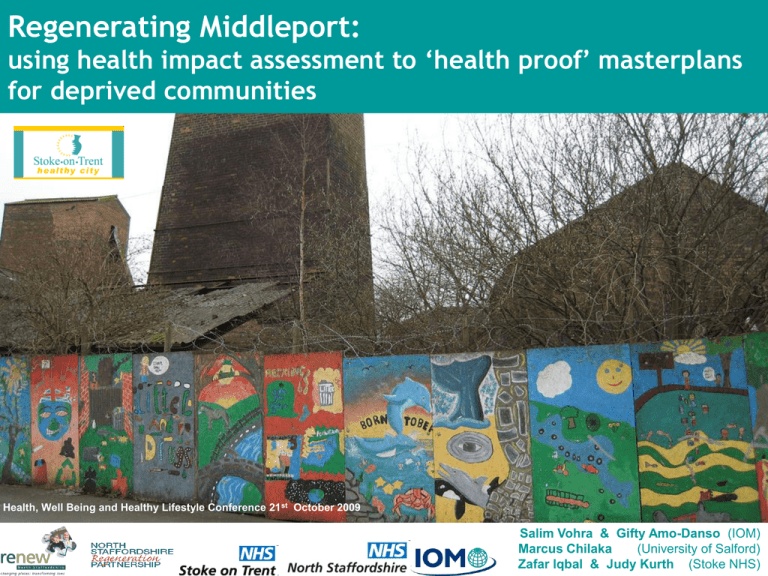
Regenerating Middleport: using health impact assessment to ‘health proof’ masterplans for deprived communities Health, Well Being and Healthy Lifestyle Conference 21st October 2009 Salim Vohra & Gifty Amo-Danso (IOM) Marcus Chilaka (University of Salford) Zafar Iqbal & Judy Kurth (Stoke NHS) Meaning of Health in HIA “Health is a state of complete physical, mental and social wellbeing and not merely the absence of disease or infirmity… …Health is therefore a resource for everyday life, not the objective of living; it is a positive concept emphasizing social and personal resources, as well as physical capacities.” World Health Organization, 1947 and 1984. Environmental and Social Model of Health Adapted by Salim Vohra and Dean Biddlecombe from Dahlgren, G. and Whitehead, M. (1991). Policies and strategies to promote social equity in health. Stockholm, Institute for Future Studies. Classic Definition of Health Impact Assessment HIA is: a combination of procedures, methods and tools by which a policy, program or project may be judged as to its potential effects on the health of a population, and the distribution of those effects within the population. Gothenberg Consensus Document 1991 Fuller Definitions of Health Impact Assessment HIA is the key systematic approach to predicting the differential health and wellbeing impacts of proposed and implemented plans, programmes and projects within a value framework that is democratic, equitable, sustainable and ethical in its use of evidence so that positive health impacts are maximised and negative health impacts minimised (within a given population). It uses a range of structured and evaluated sources of qualitative and quantitative evidence that includes public and other stakeholders' perceptions and experiences as well as public health, epidemiological, toxicological and medical knowledge. Steps in the HIA Process Screening Scoping Baseline and community profile Evidence review Stakeholder engagement Analysis Mitigation and enhancement HIA Report or Public Health Statement Follow up (monitoring and evaluation) Strengths: Weaknesses: Flexible No standard approach Open Inclusive Depends on experience of the HIA assessor WHO 12 Healthy Urban Planning Principles Healthy Lifestyles Do planning policies and proposals encourage and promote healthy exercise? Social Cohesion encourage and promote social cohesion? Housing Quality encourage and promote social cohesion? Access to Work encourage and promote access to employment opportunities? Accessibility encourage and promote access accessibility? Local low-input food production encourage and promote local food production with low input food production? WHO 12 Healthy Urban Planning Principles Safety encourage and promote safety and the feeling of safety in the community? Equity encourage and promote equity and the development of social capital? Air quality and aesthetics encourage and promote good air quality, protection from excessive noise and an attractive environment for living/working? Water and sanitation quality encourage and promote improved water and sanitation quality? Quality of land and mineral resources encourage and promote the conservation and quality of land and mineral resources? Climate Stability encourage and promote climate stability (and reduce the potential impacts of climate change)? Stoke-on-Trent & Deprivation Ariel View of Middleport Satellite View of Middleport Photos of Middleport Vision and Objectives of the Masterplan Process Vision “To create a truly sustainable community ... Working in partnership with local residents and businesses … create a vibrant community where people want to live, work ... Drawing on and improving the core physical, environmental and heritage assets of the area, … become an exemplar sustainable community … excellent standards of day to day living and strengthening community pride and ownership of the environment.” Objectives 1. Creating Sustainable Neighbourhoods 2. Achieving a Better Housing Choice 3. Strengthening Employment and Training Opportunities 4. Addressing Community Needs 5. Delivering Improved Access 6. Creating a Good Quality Environment Addressing the Health and Wellbeing Needs of the Community 7. Protecting and Enhancing Heritage Assets 8. Community Enhancement Draft Masterplan Design 1 Draft Masterplan Design 2 Draft Masterplan Design 3 Where Does Reviewing Masterplans Fit In Screening Scoping Baseline and community profile Evidence review Stakeholder engagement Analysis Mitigation and enhancement HIA Report or Public Health Statement Follow up (monitoring and evaluation) Reviewing/ analysing the masterplan designs / drawings Part of HIA or can be done seperately? 10 step process to ‘health proofing’ masterplans Step 1 Connecting with the masterplan design team Step 2 Obtaining masterplan design/s and background documents Step 3 Visiting the proposed site Step 4 Analysing the Masterplan Vision and Objectives Step 5 Identifying key professional and community stakeholders to help review Step 6 Looking at and analysing the draft masterplan design/s Step 7 Seeking clarification from the masterplan design team Step 8 Writing up the analysis Step 9 Making recommendations for modifying the final masterplan design Step 10 Following up on the changes made to the final masterplan design Rapid Review Table Masterplan Design Option No. & Name: Design Review Questions What is the relationship between the housing, greenspace, roads, shops/amenities and business areas? How do they fit together or don’t? Does it make holistic sense? Is it ‘legible’/understandable (easy to navigate through the streets)? Do the blocks of new housing fit with the existing blocks of housing? Is there affordable/key worker housing? Is greenspace maintained, increased and improved? Is it accessible? Is there an opportunity for allotments/communal gardening? Do roads and routes connect residents or serve to cut them off (physical/community severance)? Are pavements/footpaths, cycleways and public transport links developed? Do they form a coherent and connected linked set of routes? Do they have priority over cars? Is there a public space, a service hub, a local centre that serves as the heart of the area? What kinds of public services, amenities and facilities are planned? Are there any gaps in service? Is there provision for a local community centre and/or space for community/voluntary/charity groups? Are there good natural surveillance/ opportunities for people to pass by? How do the commercial areas fit with each other and with the residential areas? Is it too big/too small? How does the proposed development link with other adjacent neighbourhoods? Is there any local art/distinctive landmark/ architecture planned to build and create a revived sense of place/community identity? Analysis In-depth Review Table Masterplan Design Option No. & Name: Healthy Urban Planning Themes Regeneration/Development Objectives to Consider Healthy Lifestyle Does the development encourage and promote physical activity? Is the community walkable? What type of amenities, facilities and public services are planned or exist already that are nearby? What existing sports/leisure facilities are there and will they cope with any increase in population? Social Cohesion (encouraging active community participation) Is there one or more accessible outdoor public spaces e.g. plazas, central open spaces? Is there provision for a local community centre or indoor public space where residents and community groups can meet and carry out activities e.g. mother and toddler groups, youth work groups, community development activities? Do the new and/or existing commercial developments fit well with the residential developments and the wider neighbourhood? Is there integration between existing housing and new housing? How do new routes and roads affect the community setting? (physical and community severance) Building quality (Housing and What sustainable and healthy building standards will be used for the residential and commercial Potential positive health/ wellbeing impacts Potential negative health/ wellbeing impacts Suggestions for mitigation and enhancement/ Other Comments/Questions Recommendations for Middleport Health Themes: A walkable community A socially rich and cohesive community A physically active community General: Make parks as attractive, safe, accessible and well maintained. Make better use of canal towpath/footpaths and cycleways. Ensure no fast food in any new retail spaces that are developed. Locate new industrial sites towards Steelite rather than adjacent to Grange Park and cluster employments sites together. Support the greening/public realm and environmental improvements e.g. plant trees along the roads, improved street furniture, and removal of non-essential signs. Support the creation of Home Zone areas throughout the development and additional safe crossing points across Middleport. Improved lighting across the whole development Recommendations for Middleport Advantages of this approach Flexible and quick input into the masterplan design process Systematic and structured use of a health ‘lens’ to scrutinise a masterplan Provide support for the masterplan from health agencies Some aspects are likely to be covered by experienced planning officers and masterplan designers Detailed assessment can be time consuming May be confused with doing a health impact assessment

